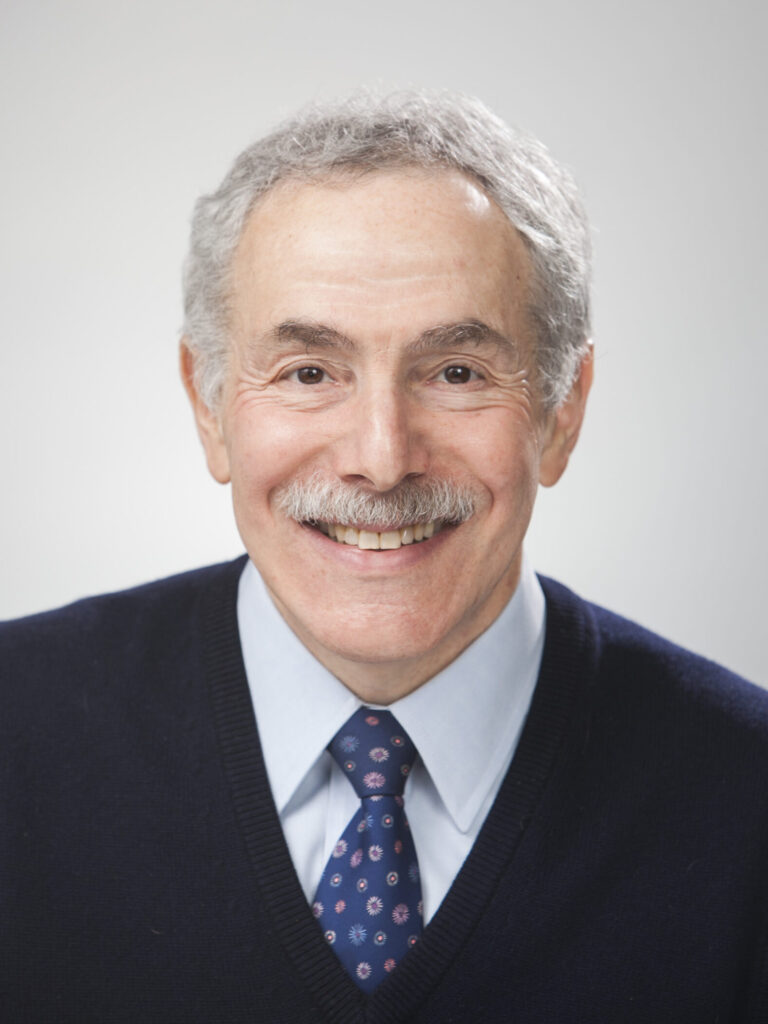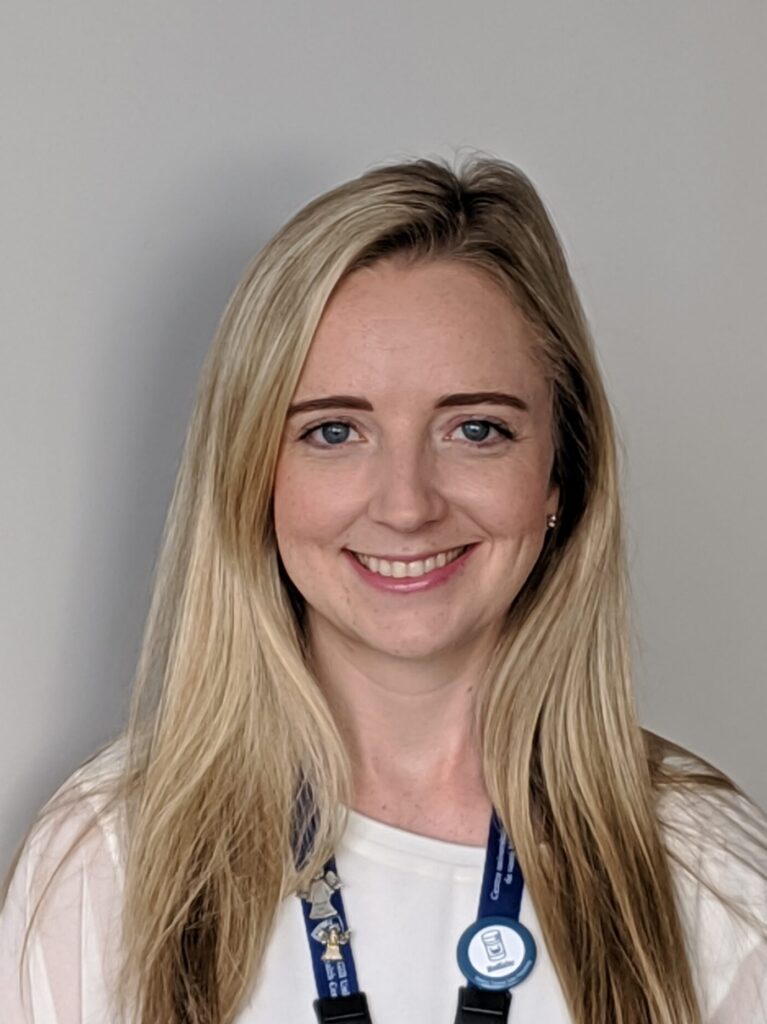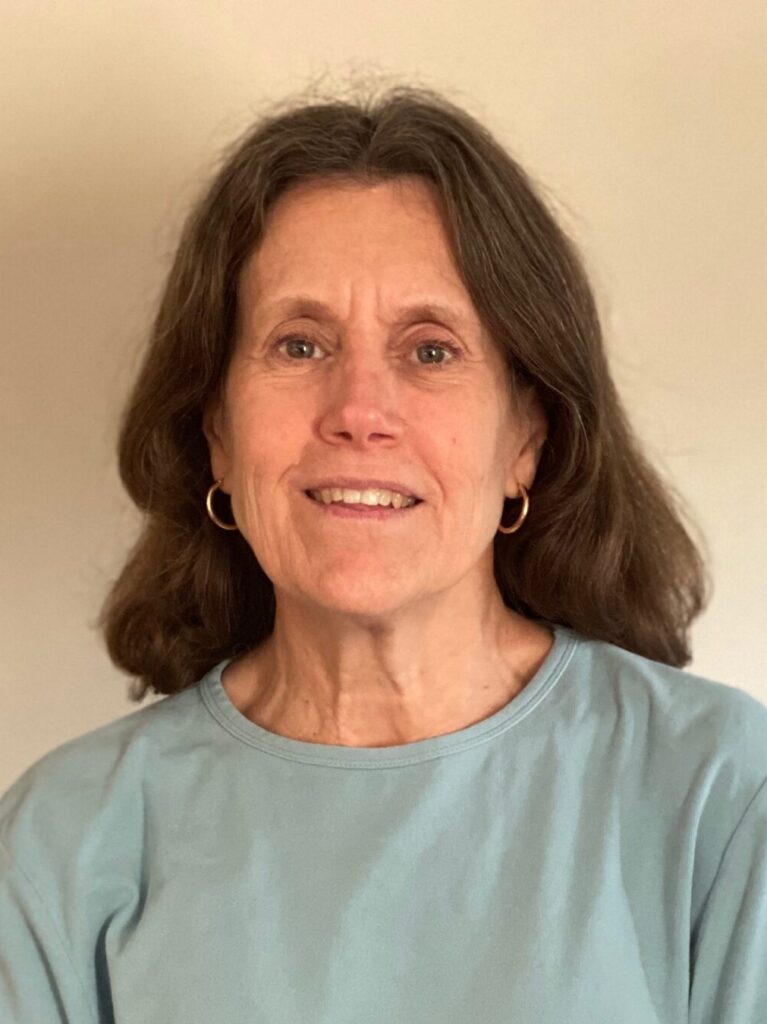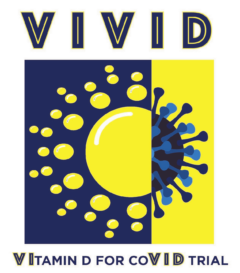Study Design
The Vitamin D for COVID-19 (VIVID) study is a clinical trial that is evaluating whether taking vitamin D supplements can reduce the severity of symptoms and reduce the rate of seeking healthcare for symptoms or concerns related to a diagnosis of COVID-19. It is also studying whether vitamin D supplements reduce the chances of becoming infected with the novel coronavirus, if you have been exposed to someone in your household who received a positive test for COVID-19.
Watch the video below to learn more:
(Read the video script – PDF)
Fingerprick instruction video:
(Read the fingerprick instruction video script – PDF)
Capitainer Self-Sampling Instructions (PDF)
Participant Information
Our study is open to people across the U.S. aged ≥18 years who have been recently diagnosed with COVID-19 (received a positive test result). You do not need to have COVID-related symptoms to participate.
If you are eligible and agree to enroll in the VIVID study, we will give you an opportunity to identify a close household contact aged ≥18 years who can also participate in the study with you. A household contact may include a spouse, partner, or family member living in your household and who has NOT been diagnosed with COVID-19. The household contact who has not been diagnosed with COVID-19 will enable us to test whether vitamin D supplements can lower the risk of becoming infected with the novel coronavirus. However, having a household contact is not required for participation.
Participants are asked to:
- Take the vitamin D or placebo study capsules every day for 28 days: 3 capsules a day on Day 1 (the day you receive your study supplies) and on Day 2; and then 1 capsule a day on Days 3 through 28. Each capsule contains 3,200 IU of vitamin D;
- Provide 2 at-home blood samples by fingerprick: 1 on the day you receive your study supplies and before you begin taking the study pills and 1 at any point during Days 25 through Day 28 (all supplies for this are provided);
- Complete a very brief, online questionnaire regarding the start of the trial in the middle of week 1;
- Complete brief, online questionnaires once a week for each of the 4 weeks that you are taking the study pills and one additional questionnaire at approximately 8 weeks from when you started your study pills.
If you have a COVID infection to be eligible, you must:
| For a household member to be eligible, you must:
|
All participants must:
- Have access to the internet to complete study surveys.
- Be willing to provide informed consent, which will be done online using a secure website.
- Be willing to take study pills (vitamin D or placebo) for 4 weeks.
- Be willing to provide 2 at-home blood samples by fingerprick: 1 at the beginning of the trial and the second near the end of the pill-taking phase (all supplies are provided).
- This is not a full list of eligibility requirements
If you are interested in participating, please click on this link to fill out the eligibility screening form on our website as soon as possible. After you complete the screening form, you will get an email that will tell you whether or not you are eligible to continue the screening process. If you are eligible you will receive an email with a secure link to a study consent form. Please fill it out as soon as possible.
If you join the trial, you will be randomly assigned (like a flip of a coin) to receive either the vitamin D or inactive placebo pills. Participants in the trial will not know if they are taking vitamin D or inactive placebo pills. You will also receive an overnight FedEx with your study pills and blood sample collection kits along with instructions. If you are positive for COVID-19 and found to be eligible for the study, you will be given a chance to invite someone in your household to participate along with you.
Vitamin D Information
Both observational studies and randomized trials suggest that vitamin D may reduce the risk of respiratory tract infections in both adults and children. The potential role of vitamin D to protect against infection by the novel coronavirus that leads to COVID-19 is promising but unknown.
Those known to be at elevated risk for vitamin D insufficiency — Black or Hispanic individuals, the elderly, nursing-home residents, or those with obesity, heart or blood vessel conditions, or chronic kidney disease — are also at higher risk of COVID-19 hospitalization and/or mortality. Finally, several observational studies have shown a significant association between a low blood level of vitamin D and poor clinical outcomes among COVID-19 patients.
Our Team
 | JoAnn E. Manson, MD, MPH, DrPH, is Professor of Medicine and the Michael and Lee Bell Professor of Women’s Health at Harvard Medical School, Professor in the Department of Epidemiology, Harvard T.H. Chan School of Public Health, and Chief, Division of Preventive Medicine at Brigham and Women’s Hospital. Read more Dr. Manson is a physician epidemiologist, endocrinologist, and Principal Investigator (PI) or co-PI of several research studies, including the Women’s Health Initiative Clinical Center in Boston, the cardiovascular component of the Nurses’ Health Study, the VITamin D and OmegA-3 TriaL (VITAL); KEEPS (Boston site), the COSMOS trial, and the VIVID trial. Her primary research interests include randomized clinical prevention trials of nutritional and lifestyle factors related to heart disease, diabetes, and other age-related disorders, the role of endogenous and exogenous estrogens as determinants of chronic disease, and COVID-19 prevention. She has done extensive research on the health effects of vitamin D supplementation. |
 | Rui Wang, PhD is an Associate Professor of Population Medicine and Director of the Division of Biostatistics in the Department of Population Medicine at Harvard Medical School and the Harvard Pilgrim Health Care Institute. She is also an Associate Professor in the Department of Biostatistics at Harvard T.H. Chan School of Public Health. Read more Dr. Wang’s research interests include the design, monitoring, and analysis of parallel and stepped-wedge cluster randomized trials. The particular questions she is addressing include the investigation of how the complex correlation structure within clusters affects the sample size and power of the trial, and how to analyze data from such trials efficiently, taking into account the correlation structure and the issue of missing data. Her research interests also include longitudinal modeling of non-linear trajectories and model selection, as well as addressing missing data issues in distributed data networks. |
 | Ganmaa Davaasambuu, PhD, is an Assistant Professor of Medicine and Associate Epidemiologist in the Department of Medicine, Channing Division of Network Medicine, Harvard Medical School (HMS) and Assistant Professor in the Department of Nutrition at the Harvard T. H. Chan School of Public Health (HSPH), Boston, MA. Read more She is a member of the Advisory Committee, Nutrition and Global Health Concentration, HSPH, and Capstone faculty advisor for Global Clinical Scholars Research Training, HMS. She is a Principal Investigator (PI) or co-PI of several studies, including the Vitamin D and latent TB infection trial, the Vitamin D and TB treatment trial, the Vitamin D and acute respiratory infection trial and the VIVID trial. Her research focus is infectious diseases including respiratory diseases and tuberculosis, vitamin D, and nutritional trials. She founded the Mongolian Health Initiative NGO, which conducts vitamin D and nutrition research and capacity building projects in Mongolia, and became a subcontractor at HSPH in 2016. |
 | Victor DeGruttola, PhD, is Research Professor of Biostatistics at the Harvard T.H. Chan School of Public Health. His primary focus is on development and application of clinical research methods for application to infectious diseases. Read more Dr. DeGruttola’s current research activities include the development of methods of analysis for partially observed data on networks. Networks of relevance for public health responses to disease outbreaks include: 1) physical proximity of pairs or groups of people at risk of becoming infected with a microbe under study, 2) viral genetic distances between viruses that infect pairs of hosts, and 3) traffic flows across geographic units of interest. Combining such developments with innovations in biostatistics provides opportunities for improving design, monitoring, analysis and interpretation of studies of interventions intended to control outbreaks or eliminate endemic diseases. |
 | Paulette Chandler, MD, MPH, is an epidemiologist and primary care physician at Brigham and Women’s Hospital and Assistant Professor of Medicine at Harvard Medical School. Her vitamin D clinical trial research focuses on understanding the role of vitamin D in the prevention of cancer and diabetes. Read more Her molecular epidemiology research focuses on understanding the connections between novel biomarkers generated through the “-omics” technology and nutrition for cancer prevention. She serves as lead for community engagement and education for COVID-19 vaccine trials at Brigham and Women’s Hospital. |
 | Kenneth H. Mayer, MD, is trained in Internal Medicine, Infectious Diseases, and Molecular Epidemiology. As the founding Medical Research Director of Fenway Health, he created a community health research program that has developed an international reputation for its capability to conduct community-based research. Read more He is currently a Professor of Medicine at Harvard Medical School, a Professor in Global Health and Population at the Harvard TC Chan School of Public Health, and Attending Physician and Director of HIV Prevention Research at Beth Israel Deaconess Hospital. Since 1994, he has been a site Principal Investigator of NIH-funded HTVN, HPTN, MTN, and ATN clinical trials units, focusing on bio-behavioral HIV prevention research, and a member of the scientific leadership of HPTN and HVTN. He is an Editor-in-Chief of the Journal of the International AIDS Society, and serves on the PEPFAR Scientific Advisory Board. He is an investigator in the NIH’s COVID-19 Prevention Network. |
 | Susan Redline, MD, MPH, is the Peter C. Farrell Professor of Sleep Medicine at Harvard Medical School and Director of the Programs in Sleep and Cardiovascular Medicine and Sleep Medicine Epidemiology at Brigham and Women’s Hospital, Harvard Medical School. Read more She directs the Sleep Reading Centers for a number of major cohort studies and clinical trials and co-directs the National Sleep Research Resource, a large repository of research data and tools to promote sleep research. She and Dr. Wang co-direct the Data Coordinating Centers for several NIH-funded multi-center clinical trials. Her research addresses 1) the etiologies of sleep disorders, including the role of genetic and early life developmental factors and health disparities; and 2) the cardiovascular and other health outcomes of sleep disorders and the role of sleep interventions in improving health. |
 | Valerie E. Stone, MD, MPH, is Vice Chair for Diversity, Equity and Inclusion of the Department of Medicine at Brigham and Women’s Hospital (BWH), and she is Co-Chair of the DOM Health Equity Committee. Dr. Stone is an academic general internist as well as an HIV/AIDS focused infectious disease specialist and a Professor of Medicine at Harvard Medical School. Read more Dr. Stone is a nationally recognized expert on HIV/AIDS and is the author of numerous publications on HIV/AIDS care and policy. Her research focuses on disparities in HIV/AIDS care by race/ethnicity and gender, and strategies for optimizing the care of the diverse patients living with HIV/AIDS. In 2020, Dr. Stone’s work has increasingly focused on COVID-19: she serves as Senior Advisor to the BWH COVID Equity Response Team and has published research on COVID-19 racial/ethnic disparities, and she is part of the BWH team developing a Post-COVID Clinical Care Program. |
 | Howard D. Sesso, ScD, MPH, is an Associate Professor of Medicine and Associate Director of the Division of Preventive Medicine at Brigham and Women’s Hospital and Harvard Medical School. He is also an Associate Professor of Epidemiology in the Department of Epidemiology at the Harvard T.H. Chan School of Public Health. Read more Dr. Sesso’s research focuses on vitamin and mineral supplements, and he is an expert in the design, methodology, and conduct of randomized clinical trials, having tested several different commonly used dietary supplements in relation to blood pressure and major health outcomes. |
 | Aditi Hazra, PhD, MPH, is an Assistant Professor of Medicine at Harvard Medical School and Brigham and Women’s Hospital. Dr. Hazra’s American Cancer Society funded Research Scholar Grant aims to improve stratification of subsequent breast cancer risk among racially diverse patients with DCIS (ductal carcinoma in situ). Read more The completion of the RNA sequencing and the “precision health equity” aims may lead to personalized treatment for all DCIS patients to reduce risk of DCIS progression to invasive breast cancer. To improve the lives of vulnerable and underserved populations, Dr. Hazra is an active voice in the community. She is the Founder of PinkSari for global cancer prevention and STARS (Strength Training And Research for Survivorship) for cancer survivorship. Dr. Hazra volunteered with the Mass General Brigham Center for COVID Innovation to evaluate rapid, point-of-care COVID-19 tests during the pandemic. |
 | Walter C. Willett, MD, DrPH, is Professor of Epidemiology and Nutrition at the Harvard T.H. Chan School of Public Health and Professor of Medicine at Harvard Medical School. He served as Chair of the Department of Nutrition at Harvard for 25 years. His work has focused on development of methods, using both questionnaire and biochemical approaches, to study the effects of diet on the occurrence of major diseases. Read more He has applied these methods to large cohort studies, including nearly 300,000 men and women, that are providing the most detailed information on the long-term health consequences of diets. Dr. Willett has published numerous articles, primarily on lifestyle risk factors for cardiometabolic disease and cancer, and has written the textbook, Nutritional Epidemiology. He is a member of the National Academy of Medicine. |
 | Todd C. Lee, MD, MPH, is a clinician scientist and Associate Professor at McGill University in Montreal, Canada. His area of expertise is in the conduct of pragmatic randomized controlled trials and in the use of technology to facilitate follow-up and collect patient reported outcomes. Read more He was the Canadian principal investigator for some of the first outpatient clinical trials for Covid-19 to have been completed and published. |
 | Dr. Emily McDonald is an Assistant Professor of Medicine in General Internal Medicine at the McGill University Health Centre in Quebec, Canada, and the Director of the Department of Medicine Clinical Practice Assessment Unit. Read more Her research interests include safer prescribing for older adults, clinical trials related to high value medical care, and clinical trials related to COVID-19 prevention and treatment. In March 2020, she took up running when all the yoga studios closed in Quebec because of COVID-19. |
 | Trisha Copeland, MS, RD, LDN, is a Senior Project Manager and Dietitian in the BWH Department of Medicine’s Division of Preventive Medicine. She works in the operation and management of clinical trials. Read more At the Division she has been involved with the clinical components of the Vitamin D and Omega-3 Trial (VITAL), the Cocoa Supplement and Multivitamin Outcomes Study (COSMOS), and the Trial of Magnesium Supplementation and Blood Pressure Reduction among Adults with Untreated High Blood Pressure. She has worked on other nutrition-oriented trials over the years and has an interest in how lifestyle risk factors affect health. |
 | Georgina Friedenberg, MPH, is Senior Project Manager in the Division of Preventive Medicine at Brigham and Women’s Hospital. She has worked on several large-scale clinical trials conducted at the Division including the Vitamin D and Omega-3 Trial (VITAL), the Cocoa Supplement and Multivitamin Outcomes Study (COSMOS), a Randomized Clinical Trial of Lantus for C-Reactive Protein Reduction in Early Treatment of Type 2 Diabetes Mellitus (LANCET), and the Women’s Health Study (WHS). Read more Her areas of interest are epidemiology, biostatistics, and clinical trials. |
 | Allison A. Clar, BS, is a Senior Research Assistant in the Division of Preventive Medicine at Brigham and Women’s Hospital. Since she started in 2015, she has worked on several research studies including the VITamin D and OmegA-3 TriaL and the COcoa Supplement and Multivitamin Outcomes Study. Read more Her interests include clinical prevention trials and data management. |
 | Michael Rueschman, MPH, is a Clinical Data Manager in the Division of Sleep and Circadian Disorders. He has worked on many observational studies and clinical trials. Read more Michael is the data steward for the National Sleep Research Resource, an NHLBI-funded data sharing repository. |
Other Resources
- Vitamin D and COVID-19 Trial – ClinicalTrials.gov
- Brigham and Women’s Hospital
- Division of Preventive Medicine – Brigham and Women’s Hospital
- Division of Sleep Medicine – Brigham and Women’s Hospital
Contact Us
Division of Preventive Medicine
Brigham and Women’s Hospital
900 Commonwealth Avenue East – 3rd Floor
Boston, MA 02215
vividstudy@partners.org

